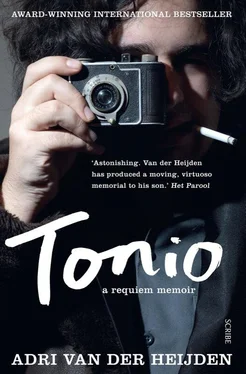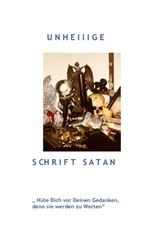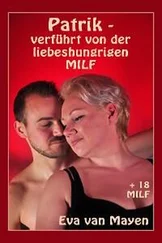‘Come on, get into that outfit you had on recently. Make-up, too. This is something to be celebrated.’
‘Now? It’s not even noon.’
‘We’ll go kit out the nursery first. No time to lose.’
In a furniture boutique on the Rozengracht, I bought her the modern extendable dining table she’d had her eye on. It cost me a fortune, but who cares. The centrepiece of the living room would remind us of this day forever. Fully extended, it could seat ten.
‘The test didn’t say anything about octuplets,’ Miriam said.
‘Never can be too careful.’
I rang my brother from Café De Zwart. He reacted rather cautiously. ‘Don’t you think you should wait a few months,’ he said, ‘before you go telling everybody? Anything can happen.’
‘You’re not everybody. But thanks for the tip. I’ll keep it under my hat for the time being.’
Inside, Miriam was drinking apple juice. ‘I’ll have a glass of wine at dinner. Just this once. So … what’d Frans say?’
‘He says we should keep mum for the next three months. Till we’re sure nothing goes wrong, a miscarriage or something.’
‘The heck with him. I’m going to shout it from the rooftops.’
Now that my share of the job was completed, my blood no longer had to be kept alcohol-free. From now on I could drink what I wanted, and did just that. Later that afternoon, we took a tram to Central Station. Whenever we had something to celebrate, we did it at De Bisschop, a restaurant in Leiden. Of everything we ordered, I only remember the bottle of Margaux, which was — minus half a glass — all for me. While the wine warmed me I gazed, speechless, at the girl across from me, who was still my girl, but since this morning with a blissful asset that belonged indivisibly to both of us.
If the foetus proved viable and grew into a full-fledged child, then it must never escape my vigilance. Write? Only as breadwinner for the little one and his obliging parents, and only then during the time-outs from fatherhood. It was a weighty oath I silently made to myself in De Bisschop. Dread and delight struck home in alternation.
‘I’ve heard Theo mention the title of his opera so often,’ I said to Miriam, ‘that if it’s a girl, we’ll name her Esmée.’
‘Don’t let Frans hear you,’ she said. ‘In three months, we can bring it up again.’
CHAPTER TWO. ‘So who’s the third?’
1
With a child on the way, we thought it best to get married forthwith. The ceremony was scheduled for 24 December 1987. I had read somewhere that in Switzerland they had invented a digital watch whose alarm would go off once a year, showing the telephone number of the local florist in the display, so you knew: today is my anniversary. I figured that putting it on a special date would compensate for my innate forgetfulness — and it was cheaper to boot.
A Christmas Eve wedding: the family was not amused. The 24th of December, damn it, was Christmas-dinner shopping day. We decided to make it an intimate family wedding, giving the hubbub of a reception a pass: my father suffered from emphysema, my sister nearly did, and my brother had burnout. But once confronted with the hostile mood on the day itself, I sorely regretted not having organised a bacchanal for my friends, colleagues, and the pub regulars.
The words that kept cropping up among the guests were haricots verts , which had to be procured from a particular Beethovenstraat vegetable shop for Christmas dinner. There was also, among my siblings and sister-in-law at least, a certain lack of empathy with the wedding itself. Surely no one got married anymore?
The only one who kept the mood up and running was my mother-in-law, who every half-hour asked for a repeat of the Mendelssohn wedding march, which I had put on for the opening of the first bottle of champagne. Once seated, my mother confessed to having spent the whole week agonising over whether to prepare a humorous speech. She had planned to bring up the cowboy chaps I had received from her sister in Australia for my First Communion: they were open at the back, of course, leaving my legs bare and thus inviting jeers from the neighbourhood scallywags: ‘Half of your pants are still caught on the barbed wire.’
The girl who faithfully sped past my parents’ house on her white scooter, without it ever having led to an affair, was another of the barbs she looked forward to. Just like my scraping together my vacation money picking strawberries, and my refusal to be caught using my father’s Honda moped.
The poor woman was not up to delivering this kind of toast. ‘So … that’s that,’ she said with that stock trivialising gesture of hers, which meant: don’t mind me, I’m too stupid for that kind of thing.
I was sorry she didn’t, all the more so because no one had taken the trouble to prepare even a modest toast. I looked over at my sister. We had grown up together. At Sinterklaas I had produced long, rhymed epic poems for her, even for the most trifling gifts. She would usually read it out in complete non-metre, and then promptly tear it up. Now that her eldest brother was getting married, she had nothing to say except the customary handful of bitchy gossip. She spent the whole afternoon sitting there with a smug smirk on her face, chain-smoking in an attempt to catch up with my father’s emphysema. With each coughing fit, her eyes narrowed into little stripes in her carmine-red face.
It never occurred to me that even our immediate family might be susceptible to outright envy. The 250-square-metre flat, this wedding, a child on the way … Things were going too well for us, and you know what, they were right.
The pregnancy was going fine, and the child’s legitimacy was confirmed. Nothing stood in its way, not even my own fears. I feared that which I loved at the same time: the vulnerability of a child.
The responsibility I so dreaded was already manifesting itself. The child was due the first week of July. My fingers trembling, I counted down the days.
2
‘What is it with young people these days?’, I wondered more and more. ‘Aren’t they angry anymore, or what? Tonio is eighteen, has his high school diploma, studies at university … but is still living with his parents. In his boyhood room. Of course we’re secretly glad to postpone the empty nest syndrome … but for him …’
Parents in the same situation, with more sociological instinct, would reply: ‘What it is, is there’s no generation gap anymore. Well, okay, there is, but it’s not such a chasm. The generational differences don’t lead to insoluble conflicts anymore. Everything can be discussed. Everything can be solved. Why run away from a father who doesn’t want to murder you, nor you him? When’s the last time Tonio and you argued?’
Never, actually. Our only argument, which never really got off the ground either, was still to come. Since he was a child, until he was at least sixteen, he would ask at the end of the day: ‘Work well today?’ (Just like, at the end of a meal, he would ask: ‘May I be excused?’ He would drop his voice an octave, as though wanting to feign the maturity befitting the somewhat affected question. He must have picked up this nicety somewhere and appropriated it, because he didn’t learn it from us.) You couldn’t argue with this kind of kid even if you tried.
Barely two years after graduating high school, he managed to find a sublet apartment in De Baarsjes with his best friend Jim. Standing on his own feet suddenly outweighed the cushy room and board at home. It was April 2008. I wasn’t even able to help him move, as I was in the midst of a series of guest lectures at TU Delft. I do recall the stab in my heart: he had flown the nest after all. I felt a bit slighted, so that the missing generation gap also took its toll. All right, if he really wanted to trade his space, his comfy, well-appointed room on the Johannes Verhulststraat, for half a stuffy flat over in Amsterdam West: fine. Bye-bye, kid, don’t let me catch you on our doorstep with your tail between your legs.
Читать дальше












